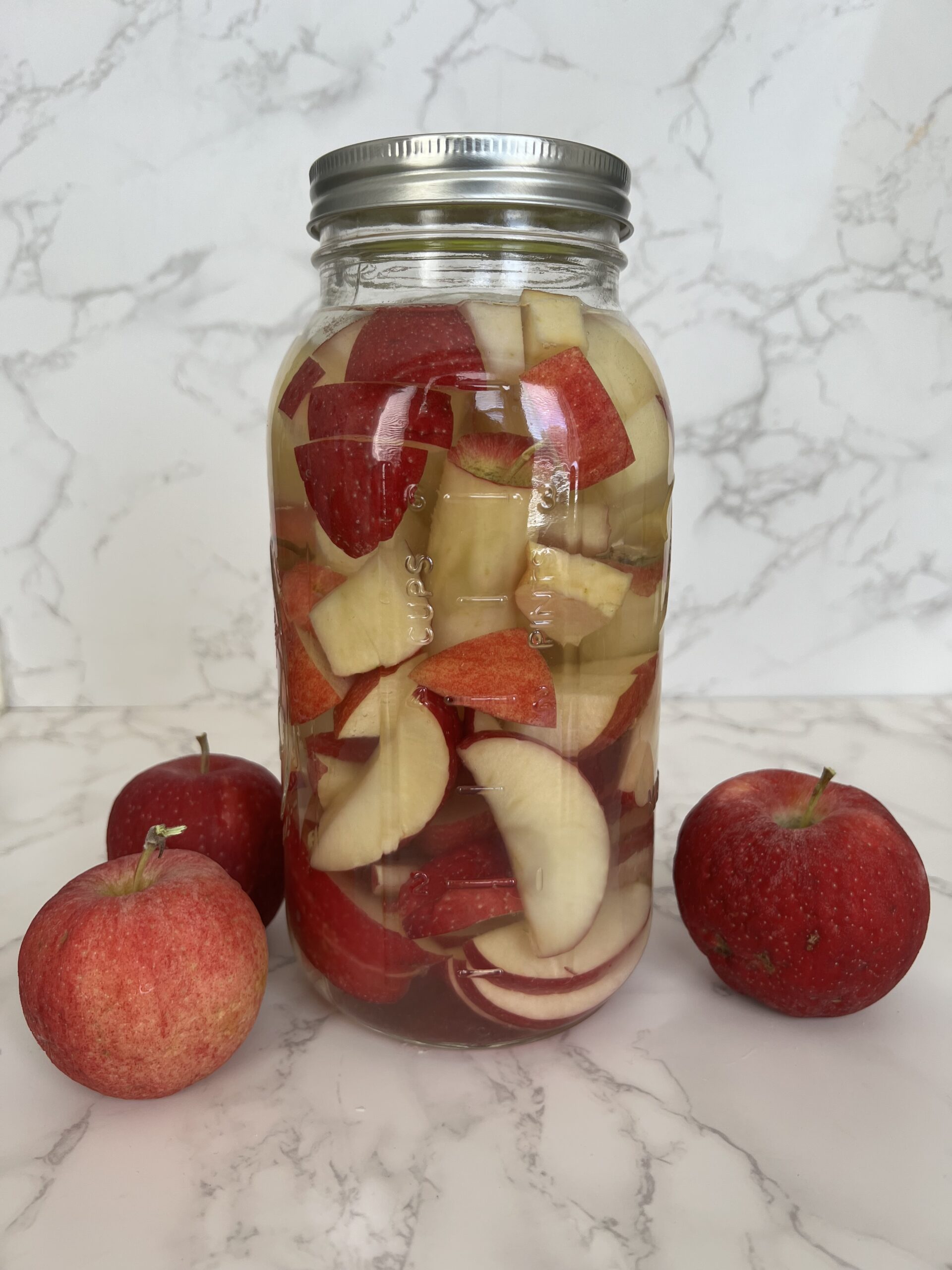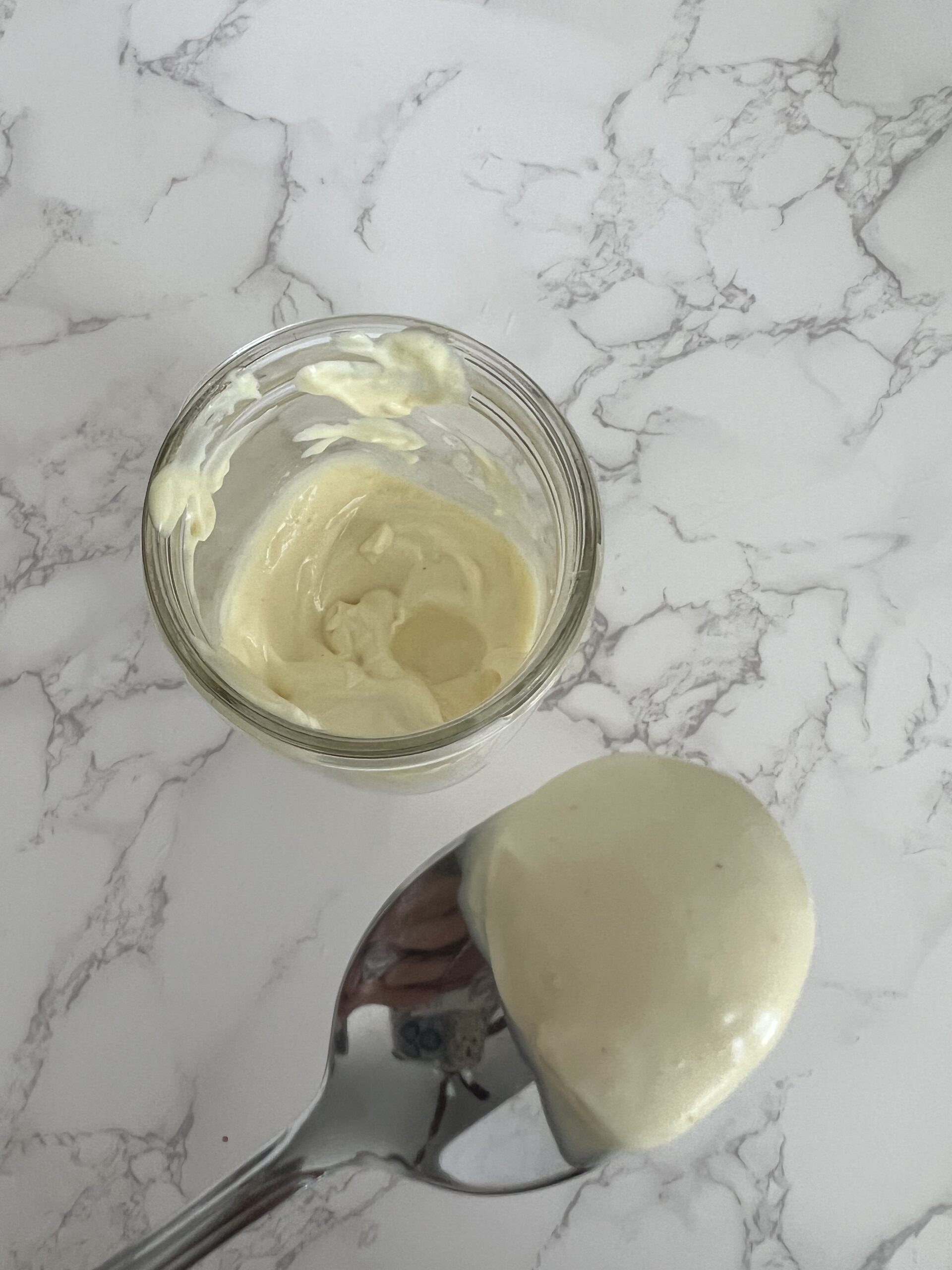
What is Apple Cider Vinegar?
Homemade apple cider vinegar is so easy to make, yet has such great benefits! ACV is a type of vinegar made from fermenting apples. It is produced by adding sugar water to apples (or apple scraps like the peels and cores), which is then fermented with the help of bacteria and yeast. The fermentation process converts the sugars in the apple to alcohol, which is further converted into acetic acid by bacteria. This acetic acid gives apple cider vinegar its characteristic sour taste and strong odor.
Looking for more fermenting recipes? Check them out HERE!
Benefits of Homemade Apple Cider Vinegar
1. Promotes Digestive Health: One of the primary benefits of apple cider vinegar is its ability to support healthy digestion. ACV contains acetic acid, which aids in breaking down food and enhancing nutrient absorption. It also stimulates the production of digestive enzymes, helping to alleviate symptoms such as bloating, indigestion, and heartburn.
2. Balances Blood Sugar Levels: Apple cider vinegar has been shown to have a positive impact on blood sugar control. Studies suggest that consuming ACV before meals can help lower post-meal blood sugar spikes, making it particularly beneficial for individuals with diabetes or insulin resistance. However, it is important to consult with a healthcare professional before incorporating ACV into your routine if you have any underlying health conditions.
3. Supports Weight Loss: Incorporating apple cider vinegar into a balanced diet and exercise regimen may aid in weight loss efforts. The acetic acid in ACV helps increase feelings of fullness, reducing overall calorie intake. Additionally, it may help boost metabolism and promote fat burning, though further research is needed to fully understand these mechanisms.
4. Boosts Immune Function: Apple cider vinegar possesses antimicrobial properties that can help combat harmful bacteria and pathogens. It also contains antioxidants like vitamin C, which supports immune function and helps protect against oxidative stress.
5. Improves Skin Health: ACV can be used topically to improve various skin conditions. Its antibacterial properties make it effective in treating acne, while its pH-balancing properties can help soothe and restore the skin’s natural barrier. However, it is important to dilute ACV before applying it to the skin to avoid irritation.
6. Enhances Hair Health: Apple cider vinegar can be used as a natural hair rinse to promote shine, reduce dandruff, and restore the scalp’s pH balance. It helps remove product buildup and excess oil while maintaining the hair’s natural moisture levels.
Disclaimer: The information provided in this blog post is for informational purposes only and should not be considered as medical advice. Always consult with a healthcare professional before incorporating apple cider vinegar into your routine or making any changes to your health regimen.
Ways to use Homemade Apple Cider Vinegar
Apple cider vinegar is a versatile ingredient that can be used in various ways to enhance your daily routine. From used in the kitchen to beauty and around the house, ACV offers numerous benefits:
In Salad Dressings and Marinades:
One of the most common culinary uses of apple cider vinegar is in salad dressings and marinades. Its tangy flavor adds a delightful kick to various dishes. Combine ACV with olive oil, herbs, and spices to create a healthy and flavorful dressing for your salads or use it as a marinade for meats and vegetables.
As a Digestive Aid:
Apple cider vinegar has been used for centuries as a natural remedy for digestive issues. Consuming a diluted solution of ACV before meals may help improve digestion by increasing stomach acid production. This can alleviate symptoms such as bloating, indigestion, and heartburn. However, it is important to consult with a healthcare professional before using ACV for digestive purposes.
For Pickling Vegetables:
ACV’s acidic nature makes it an excellent choice for pickling vegetables. The acetic acid in apple cider vinegar helps preserve the crispness and freshness of vegetables while adding a distinctive tangy flavor. Experiment with pickling cucumbers, onions, carrots, or any other vegetable of your choice using a mixture of ACV, water, salt, sugar, and spices.
In Homemade Fermented Foods:
If you enjoy making fermented foods at home, apple cider vinegar can be a valuable ingredient. It contains beneficial bacteria that aid in the fermentation process. Use ACV as a starter culture for homemade kombucha, sauerkraut, or pickles to enhance their flavor and promote healthy fermentation.
Tools for making Apple Cider Vinegar
- Large jar– I like to use a 1/2 or full gallon jar for this. You can use a quart jar but to get the jar gets mostly filled with apple. To get a nice amount of vinegar, I use a bigger jar.
- Fermentation weights-This helps prevent mold. Any pieces of apple that float to the top of the liquid are in danger of molding. A fermentation weight helps to keep it submerged.
- Fermentation lid– I like these because they breathe so well on their own!
- Organic sugar- I prefer to use organic sugar because I don’t want to add pesticides to the mix!
I have items for the home, garden and more HERE!
Homemade Apple Cider Vinegar
Ingredients
- organic apples- this can be apple pieces or just scraps like peels and cores
- 1 tablespoon sugar per cup of water OR 1 cup of sugar per gallon
Instructions
- Wash the apples and cut them into small pieces, including the peels and cores.
- Place the apple pieces in the glass jar, filling it about three-quarters full.
- Stir the sugar in the water and pour it into the jar to cover the apple pieces completely.
- Insert fermenting weight (optional but works best, in my experience). Cover the jar with a fermenting lid, piece of cheesecloth or coffee filter and secure it with a rubber band.
- Store the jar in a cool, dark place for about two weeks, stirring every days.
- After two weeks, strain out the apple solids. Return the liquid to the jar and cover it again with the lid, cheesecloth or coffee filter.
- Allow the jar to sit for an additional four to six weeks, stirring occasionally. Taste the vinegar periodically until it reaches your desired acidity level. Once ready, transfer the vinegar to a clean bottle or jar and store it at room temperature or in the refrigerator.
- ACV is good for 1-2 years and the tastes continues to improve with age.












I’m nearing completion with my apple cider vinegar and have some solid something that seems to have grown in from sides as it is round. Is this normal? What do it do, please?
Author
What you’re describing sounds like the mother. This is normal and you just leave it as is.